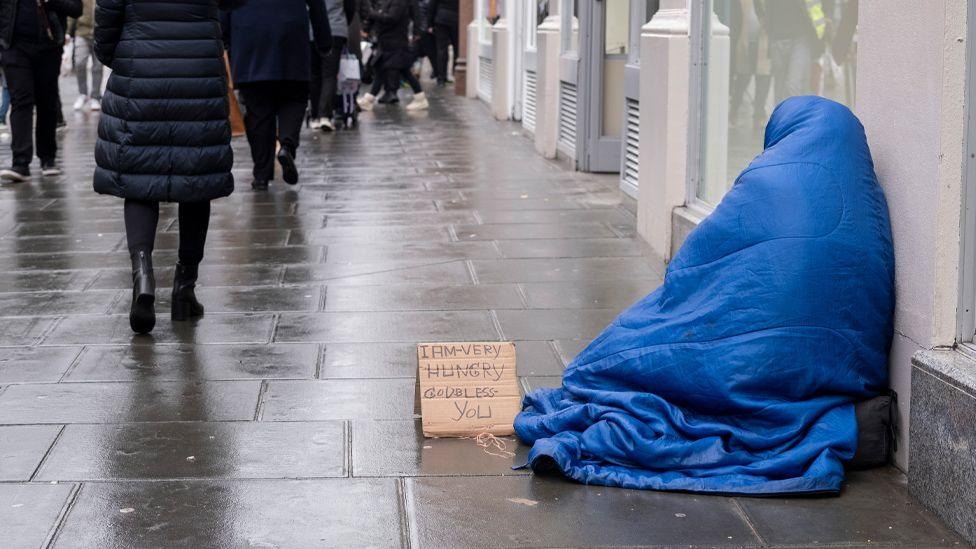Councils call for cash to cover homeless bill shortfall

- Published
Councils in England facing soaring homelessness costs are urging the government to foot more of the bill, the BBC can reveal.
Local authorities which house people in temporary accommodation generally pay the up-front costs and claim the cash back from central government.
But the cross-party Local Government Association (LGA), which represents councils across England, says a 2011 decision to freeze the amount they can claim back has cost them almost £740m in the last five years.
The LGA says that money would otherwise have been spent on areas such as adult social care, children’s services and preventing homelessness.
It wants the Labour government to update the system to reflect 2024 costs.
£1bn spent housing homeless families in England
- Published29 August 2024
Councils must meet housing targets, Rayner says
- Published4 December 2024
Cost of housing homeless people in London £4m a day
- Published25 October 2024
The LGA, external says the increasing number of people needing to be housed in temporary accommodation, combined with the rise in costs per person, has resulted in a funding gap of £737.3m over the last five years.
“You've seen the dramatic increase in the cost of rents since 2011," Adam Hug, the LGA’s housing spokesperson, told the BBC.
"So it's getting increasingly expensive in a constrained market to find places that are suitable for people to live at costs that councils can afford."
That lack of available accommodation options has meant many councils have had to use more expensive options, such as hotels and bed and breakfasts, to house those in need.
Official government data released last week showed, external a record 123,100 households were in temporary accommodation at the end of June, a 16% rise on last year.
Matt Downie, chief executive of homelessness charity Crisis, told the BBC: “As more and more people are pushed into homelessness due to rising living costs and sky-high rents, they have nowhere else to go but to their local council, who too often have nowhere to put them but into expensive temporary accommodation that is often unfit for their needs.”
If someone meets the conditions for receiving temporary accommodation, it is often up to their local council to find them somewhere to stay.
The council is then usually reimbursed by the Department for Work and Pensions, using the individual’s benefits.
Historically, the amount a council could claim back was capped at 90% of Local Housing Allowance, external, which is used to work out how much in benefits people are entitled to.
But the coalition government froze that cap based on 2011 rates and no government has since unfrozen it.
“[Then-Chancellor] George Osborne and his gang decided to pass the buck to local authorities, and try and bear down on the benefits bill at the cost of many other things,” said Hug, who is also the Labour leader of Westminster City Council.
'Fair burden-sharing'
The LGA says the funding gap, the difference between what councils have paid out in housing benefit to households living in temporary accommodation and the amount they have been reimbursed for by central government, has doubled from £104.5m in 2018/19 to £204.5m in 2022/23.
London and other large cities have generally been worst hit, with Manchester, Newham and Westminster councils registering the largest funding gaps.
“We absolutely recognise the pressures in the government's finances,” said Hug, but he urged ministers to ensure there was "fair burden-sharing between local authorities and national government” when it came to funding temporary accommodation.
Labour’s general election manifesto promised “a new cross-government strategy, working with mayors and councils across the country, to put Britain back on track to ending homelessness”.
While the chancellor did commit an extra £230m to combat homelessness in the Budget, no such strategy has yet been launched.
The LGA has called on the government to “urgently” introduce that plan, which it says must tackle the “lack of genuinely affordable homes”.
Labour has pledged to build an additional 1.5m homes over the next five years to tackle the housing crisis, but a BBC investigation earlier this week revealed the vast majority of councils have cast doubt on how achievable that goal is.
The total cost for councils funding temporary accommodation in 2022/23 was £1.75bn.
That is on top of the millions of pounds a day being spent by central government housing others such as asylum seekers.
A spokesperson for the Department for Work and Pensions said: "We have inherited a housing system which is broken, which is why we are committed to the biggest increase in affordable housing in a generation, and to ensuring our social security system is fair and sustainable.”